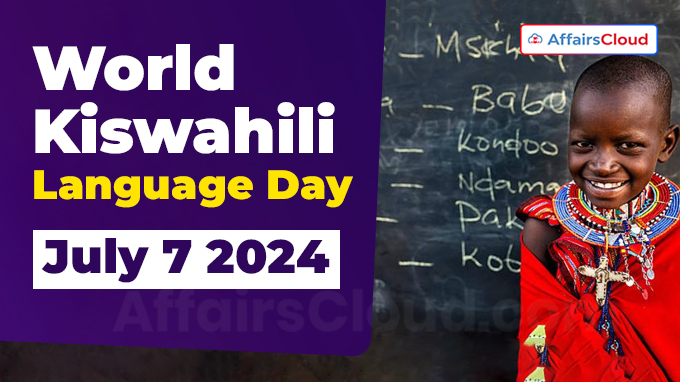 The United Nations Educational, Scientific and Cultural Organisation’s (UNESCO) World Kiswahili Language Day is annually observed across the globe on 7 July to promote the potential of Kiswahili, one of the most widely used languages of the African family.
The United Nations Educational, Scientific and Cultural Organisation’s (UNESCO) World Kiswahili Language Day is annually observed across the globe on 7 July to promote the potential of Kiswahili, one of the most widely used languages of the African family.
- 7 July 2024 marked the observance of the 3rd World Kiswahili Language Day.
- The 2024 World Kiswahili Language Day event was observed under the theme: “Kiswahili: Education and Culture of Peace“.
- This Day recognises the critical role played by Kiswahili in promoting cultural diversity, creating awareness, and fostering dialogue among civilizations.
2024 Event:
i.The 2024 event was held at the UNESCO Headquarters in Paris (France).
- The Permanent Delegation of the Democratic Republic of Congo chaired the 3rd World Kiswahili Language Day celebrations.
iii.The event was organised by the Permanent Mission of the United Republic of Tanzania to the UN; the Permanent Mission of Kenya; the Permanent Mission of the State of Qatar; and the Permanent Mission of the Sultanate of Oman to the UN, together with the Africa Group to the UN, and UNESCO.
Significance:
i.This annual event aims to promote the Kiswahili language as a symbol of peace and multiculturalism.
ii.The Day serves as a platform for promoting the potential of Kiswahili to achieve both the UN Agenda 2030 for Sustainable Development and the African Union (AU) Agenda 2063: The Africa We Want.
Background:
i.In November 2021, UNESCO at its 41st session of the General Conference in Paris adopted the resolution 41 C/61, proclaiming the July 7th of every year as World Kiswahili Language Day.
ii.The 1st ever World Kiswahili Language Day was observed on 7 July 2022.
Note: Kiswahili is the 1st African language recognised by the UN.
Why 7 July?
i.On this day in 1954, the Tanganyika African National Union (TANU) led by the Late Mwalimu Julius Kambarage Nyerere, the 1st President of the United Republic of Tanzania adopted Kiswahili as a unifying language in the struggle for independence in Tanzania.
ii.Additionally, on 7 July 2000, the East African Community (EAC) was re-established to promote cooperation and integration among East African countries, where the Kiswahili language is widely spoken.
About Kiswahili Language:
i.Kiswahili, also known as Swahili is one of the lingua franca (common language) in many countries within East, Central, and Southern Africa, and also in the Middle East.
ii.It is among the 10 most widely spoken languages in the world, with more than 230 million speakers. It is one of the official languages of the AU, Southern African Development Community (SADC), and East African Community (EAC).
iii.Kiswahili is a Bantu language belonging to the Niger-Congo family and possesses a typical, complex Bantu structure.
iv.Kiswahili is the only African language within the Directorate of Global Communications (DGC) at the UN.
- In the 1950s, the UN established the Kiswahili language unit of UN Radio.
About the United Nations Educational, Scientific and Cultural Organisation (UNESCO):
Director-General – Audrey Azoulay
Headquarters- Paris, France
Established – 1945




